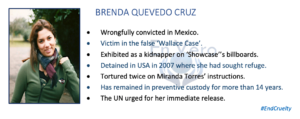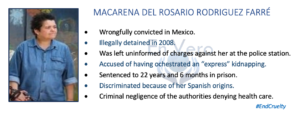Source: En Vero Spanish
Interviewer: Itzel Loranca
April 6, 2020 (Original publication in Spanish on March 19, 2018)
Translation: Emily Freele
We are publishing the transcript of the full interview conducted by Mexican journalist Itzel Loranca for SDP Noticias on the case of Yarold Leyte Quintanar (article dated March 15, 2018).
Interviewed:
– Giuliana Rojas, member of the Executive Committee
– David Bertet, Chairman of the Board of Directors
Interview with Giuliana Rojas and David Bertet on the Case of Yarold Leyte Quintanar
Itzel Loranca: Are the arguments that were expressed by the authorities in the ruling and that qualify as “unfounded” (page 68) the arguments of Yarold’s defense reliable?
Giuliana Rojas: In no case are the arguments of the defense unfounded; on the contrary, the arguments of the defense highlight all of the irregularities of the investigation. What is unacceptable and unfounded is the position of both the court of first instance and the collegiate tribunal that have decided to ignore all of these irregularities, which are evident and which stand out with a simple reading of the documents in the file. There are contradictions as to the moment when the investigative steps were taken because according to the procedural documents, in the space of an hour and twenty minutes Yarold was arrested at his home, taken to the AVI facilities, had his statement taken and a medical examination carried out, and was then taken back to his home for an ocular inspection. This simple inconsistency should have at least have stood out to the court, but not only was it ignored, it was attributed to a simple typographical error, and the judges do not seem to care that important proceedings such as Yarold’s arrest and his prior statement do not indicate the time at which they were carried out.
These inconsistencies are not even the most relevant to the proceedings. The expert evidence is completely contradictory to what Yarold stated in his forced confession. The experts from both the defense and the public prosecutor’s office came to the clear conclusion that the events did not occur as Yarold reported in his previous statement. The cause of death and the place where the events occurred are completely different from what Yarold stated. Despite this, it was decided to condemn Yarold based on the argument that he lied in his confession to facilitate his defense. This was decided simply on the basis of his forced confession as well as by closing other lines of inquiry that could have shed light on the true manner in which the events occurred.
IL: On page 90, the authorities point to the defense’s legal expertise and procedural approach as the cause of the deficiencies in the initial process. Are these observations by the authorities valid? Did they overreach in their comments?
GR: I believe that concentrating on the errors that may have been committed by the defense at the beginning of the process is not transcendent nor does it contribute to the final objective, which is to arrive at the historical truth in the particularly macabre crime that was committed against María Teresa Gonzalez. The proceedings against Yarold have been completely irregular and to reach this conclusion, one needs only to read the file. It is unacceptable that the collegiate tribunal focused part of its arguments on pointing out the supposed errors of the defense at a very early stage of the proceedings. The very serious errors committed by the investigating party, on the contrary, were minimized as a result and basically excused under the pretext of simple typing errors, as the collegiate tribunal claims in its ruling. In reality these errors demonstrate the investigation’s lack of rigor.
What we must concentrate on now is ensuring that the investigation of the torture be carried out in a thorough and impartial manner. Proving the existence of torture will undermine all the other circumstantial evidence in the proceedings on account of the fact that the determination of responsibility is based on Yarold’s forced statement.
IL: Isn’t the veracity of the “paramount importance” that the authorities attach to Yarold’s confession (page 81) affected by the allegations of torture?
GR: There is no doubt that it is. The whole theory of Yarold’s guilt is based on his confession, and not only that, but both the court of first instance and the collegiate tribunal made their decision on the basis of a criterion that is totally contrary to the principle in dubio pro reo. Both courts, by considering his confession as a divisible whole, have decided to take into consideration for their rulings only those parts that are detrimental to Yarold and not those that favour him. They also did not consider the fact that Yarold’s statement contains elements that call into question the authenticity of the confession itself and the legality of how it was obtained. The foregoing is completely contrary to the basic principles that inform criminal law and human rights, such as the principle in dubio pro reo and the presumption of innocence.
What is even more unacceptable is that only now is an investigation being ordered with regard to the torture suffered by Yarold six years ago. The Mexican authorities had the obligation to investigate these events at the time they were denounced by Yarold. Instead, six years of total inactivity have passed in this regard, six years of which Yarold has been kept in confinement. Even worse, now that an investigation has been ordered, the investigation will not be carried out by an impartial body but rather by the public prosecutor’s office. The latter has been a part of the entire irregular criminal investigation against Yarold, so there is not much hope that the investigation into his torture will be carried out with the seriousness and objectivity that the facts deserve.
If the accusations of torture are proven to be true, the entire theory of the case put forward by the public prosecutor’s office would be dismantled and the evidence on which the judgment was delivered would necessarily be completely refuted. We have no doubt that this would be the result if the investigation of the torture is carried out seriously and objectively by a completely independent body unconnected with the investigation of the criminal case.
IL: From En Vero, do you consider it an important step forward that the authorities have ordered the public prosecutor’s office to investigate the allegations of torture? (page 88)
GR: It is a step forward that at least an investigation has been ordered regarding these events, but it is not a good sign that the institution in charge of the investigation is the public prosecutor’s office. We consider it vitally important that the torture to which Yarold was subjected be investigated by a completely impartial body. The least that can be asked in this case is that the investigation be carried out by an institution that has not been a party to the criminal investigation against Yarold for only in this way can impartiality and objectivity be ensured. This would be not only to ensure that the investigation is carried out with equanimity and independence, but also to guarantee that there is no room for doubt about its results. If the institution that was part of the investigation against Yarold is the same one investigating the torture he was subjected to, there will always be a layer of doubt about the results if they are unfavorable to Yarold. For there to be real legal certainty regarding the outcomes of this investigation, it is essential that it be carried out by a fully impartial institution that has no interest whatsoever in the criminal investigation against Yarold.
IL: What legal recourse is available to continue efforts to secure Yarold Leyte’s release from prison?
GR: There are still internal recourses that can be presented to the Supreme Court of Justice and we do not rule out going to the Inter-American Court of Human Rights.
IL: In Mexico, does En Vero accompany any other case that is similar due to the insistence with which the authorities maintain the guilt of a fabricated culprit?
David Bertet: Thank you for the question. The mission of En Vero is precisely this: to accompany and follow up on cases of injustice in which we detect institutional practices of fabrication of guilty parties. The case of Yarold Leyte Quintanar is one of the most emblematic cases of this in Mexico, not only because an entire institutional mechanism was put in place beginning with the key stage of the investigation (a mechanism that first culminated in the conviction and later in its confirmation), but also because it reveals the magnitude of the damage that results from such practices, incidentally implemented by state agents. The fabrication of guilty parties results in physical damage from undue incarceration as well as torture, which is still very frequent in Mexico. However, above all, it results in irreparable emotional damage that goes beyond the direct victim (in this instance Yarold) because it also affects the relatives of innocent people unjustly detained, processed and condemned. It destroys families. This, I believe, is the most intolerable aspect of this sad reality. It is also the source of motivation that leads us to expose situations in which the system for dispensing justice ends up working in reverse by condemning the innocent instead of protecting them.
The cases that we prioritize are those that are “desperate”, those that do not enjoy media exposure and those that other human rights organizations do not want to get involved in. En Vero is able to investigate these cases independently and objectively. We adopt positions regarding the innocence of fabricated guilty parties as well as provide evidence that points to the alleged perpetrators of this fabrication in specific cases such as the case of Yarold. We do this work from our headquarters in Montreal, Canada, as well as from other places in the world where our volunteers live and work. In Mexico, we are proudly defending the victims of the Wallace case, a completely false case of kidnapping invented by the mother of the missing person. We are defending several of the accused in the Martí case, and are involved in more than 20 very similar cases in Mexico. Our organization also investigates and accompanies other cases in Latin American countries such as Colombia, and since recently, in the Middle East.




